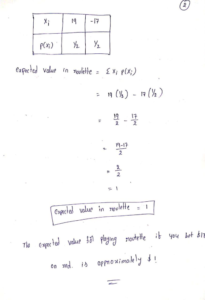How to Calculate the Expected Value in Roulette
Expected Value in Roulette
If you are a novice at roulette, it can be confusing to calculate the expected value. Expected value is a probability concept that is very useful in financial decisions. This concept is so useful, casinos hope that players do not know about it. An expected value in roulette is the percentage of money that you should win or lose when you place a bet on a single number. The player will receive $35 if that number is spun, while losing just $1 if it is not.
You can also calculate the expected value of roulette by looking at how the odds of winning and losing change over a large number of games. For example, a player can bet $10 on the red number, expecting to lose $0.53 for every $10 bet. A positive expected value increases a player’s chances of winning. The expected value of roulette varies from one game to another, but there are some games that are more risky than others.

Probability is a measure of the probability of an event. The probability of something happening is measured on a scale of 0 to 1, with a probability of 0% indicating that nothing will happen, and a probability of one being one. If you played roulette thousands of times, you would expect the ball to land in the black pocket 18 out of 38 times and in the green pocket only 28% of the time.
How to Calculate the Expected Value in Roulette
In roulette, the expected value is a calculation of the probability of winning and losing. The roulette payoffs are based on the numbers one to 36 on the board. In Las Vegas and Monte Carlo, the numbers are 37 and 38, respectively. By applying this formula, the expected value of a $1 bet is 1.895, which is the average return from a single bet. If you bet on two black numbers, you will lose $0.105, but you’ll still be ahead by betting on the opposite two numbers.
There are many types of betting in roulette. The simplest bet is the color bet. It pays out based on the exact amount that is wagered, regardless of which number is the winning number. A color bet, on the other hand, has a higher payout than an even money bet. In addition to the color, you can also make bets on the odd and even numbers. It is important to know which bets have higher payout odds.
Another important fact about roulette is the house advantage. When the roulette wheel has 18 red numbers, it has a small advantage. Nevertheless, a player who bets on these numbers has a good chance of winning. When betting on any number, including the zero, the casino uses 1:35 odds to pay out winning bets. Even money bets, on the other hand, are paid out at 1:1 odds.